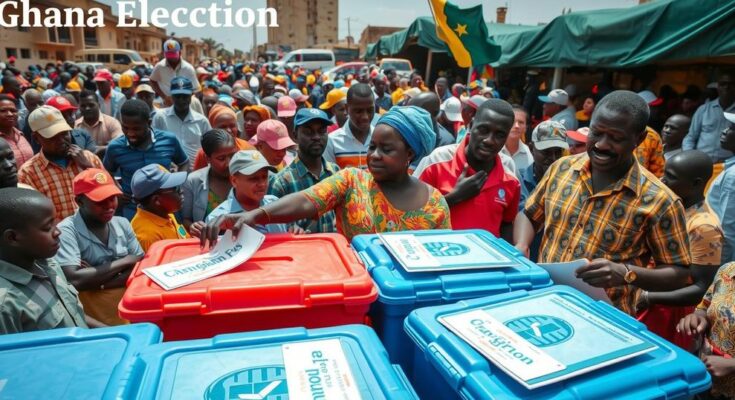Ghanaians participated in a closely contested presidential election featuring Vice President Mahamudu Bawumia and former President John Mahama. The election underscores the urgent need for economic recovery amidst a crisis marked by high inflation and a significant debt default. Preliminary results are expected soon, with both candidates focusing on economic issues and plans for reform.
Ghanaians headed to the polls on Saturday to cast their votes in a tightly contested presidential election, with Vice President Mahamudu Bawumia and former President John Mahama as the primary candidates. The elections were prompted by the pressing need for economic recovery following a significant financial crisis and a major debt default. As President Nana Akufo-Addo prepares to step down after his two-term limit, the economy remains a core issue, with voters seeking solutions to high inflation, job scarcity, and a depreciated currency.
Voting concluded at 1700 GMT, with preliminary results anticipated on Sunday and comprehensive presidential results expected by Tuesday. The political landscape has been characterized by the alternating power of the New Patriotic Party (NPP) and the National Democratic Congress (NDC) since 1992. The NPP, under a campaign slogan of “Break the 8,” hopes to secure an unprecedented third consecutive term through Bawumia, although concerns regarding the outgoing administration’s economic record persist.
Bawumia, an economist educated in the United Kingdom, expressed confidence, stating, “I am very hopeful of winning this election. I think we have done a lot of work with our message to the people and the message has been well received.” In contrast, Mahama advocates for a “reset” of the nation, promoting a “24-hour economy” and proposing adjustments to the current IMF agreement. However, Mahama faces skepticism due to memories of significant power supply challenges during his previous presidency.
The election also highlights the impact of illegal gold mining, an issue that has gained prominence as environmental concerns and economic implications unfold. With both candidates hailing from the northern region, a traditional NDC stronghold, this election is critical in determining their support in what remains a fragmented electoral landscape.
The political context surrounding Ghana’s presidential election involves a long-standing tradition of stable governance, characterized by alternating leadership between the New Patriotic Party (NPP) and the National Democratic Congress (NDC). The recent economic downturn has significantly influenced voter sentiment, leading to heightened calls for change. With inflation rates at around 23 percent and the nation negotiating a $3 billion IMF bailout, economic recovery has become pivotal. The issue of illegal mining exacerbates the turmoil, prompting discussions on environmental degradation and its effects on critical industries.
In summary, Ghana’s presidential election is a decisive moment as citizens weigh the prospects of economic reform against the backdrop of past administrations. The struggle between Mahamudu Bawumia and John Mahama encapsulates broader anxieties about economic stability, with voters expressing a desire for effective leadership that addresses their pressing concerns. Observing the results to be announced in the coming days will provide insight into the future direction of Ghana’s leadership and governance.
Original Source: www.france24.com




